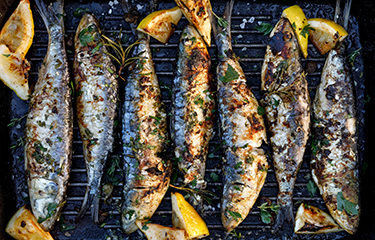SEAwise, a research project aiming to better understand fisheries management across Europe, has released a new seafood guide after reviewing the health impact of different fish and fish sizes, and the micronutrient benefits of those species.
The SEAwise project, according to a release, is devoted to creating a tool to give fishers, fisheries management agencies, and policymakers the information needed to apply ecosystem-based fisheries management in fisheries. A report by the project evaluated the health impacts and nutrient content – and possible contaminants – of different fish to create a fish recommendation system both to help drive consumer preference and ensure consumers are getting the nutrients they need.
“The general consensus among health practitioners is that we should be eating at least two portions of fish a week, including one of oily fish,” the organization said. “But beyond this generalized recommendation, which fish should you be eating?”
The guide fits into SEAwise’s objectives, it said, because the social benefits that fisheries provide are an important consideration in fisheries management.
In researching the report, SEAwise said it faced some challenges due to the large variety of fish and shellfish species that Europeans eat, making it difficult to give a broad recommendation on seafood consumption. Differing nutritional requirements between different age and dietary groups also added to the complexity.
“This means the health benefits of different species will differ accordingly,” SEAwise said. “To address this, SEAwise researchers, led by Spanish research institute AZTI, developed the SEAwise Healthy Seafood Guide, based on data relating to the specific nutritional needs of different European populations, the nutritional composition of different fish species, and any contaminants that may be present in them.”
The ultimate results of the research put species into different categories of benefit – “good for you,” “very good for you,” and “best for you.” SEAwise said that even with certain evidence of contamination, the risk-benefit analysis showed species were still healthy to consume “given the nutrients they provided, especially if consumers varied the species of fish in their diets.”
Overall, in the Baltic Sea, salmon was the only species to make it into the “best for you” category, while fish like cod, sole, herring, plaice, and sprat made it into the “very good for you” group. The “good for you group” included fish like herring, with the caveat that they should not be eaten more than once a week “on account of contaminants.”
In western waters, SEAwise said the best for your group included sardines, mackerel, and lobster, while very good for you included bluefin tuna, crab, and prawns. Species like scallops and monkfish fell into the “good for you” category.
In the North Sea, the best for you included species like mackerel, sardines, and saithe, very good for you included plaice, herring, and sprat, while the only fish in the “good for you” category was sand eel.
Finally, research of the Mediterranean put sardines, horse mackerel, and mackerel in the best for you category; ray and squid in the very good for you category; and monkfish and red shrimp in the good for you category.
“A highly nutritious food, there are many health benefits of eating fish. The diversity of fish species available and consumed across Europe, alongside the specific nutritional needs of different population groups, however, make generalized recommendations on the consumption of seafood difficult,” Research Lead Mercedes Caro of the Spanish research institute AZTI said. “This research shows how recommendations can be tailored to ensure consumers have enough information to choose the best options for their own health needs and have the confidence to choose a variety of different species when they are buying seafood, whether that is at a fish market in Vigo or a supermarket in London.”
Photo courtesy of zi3000/Shutterstock







